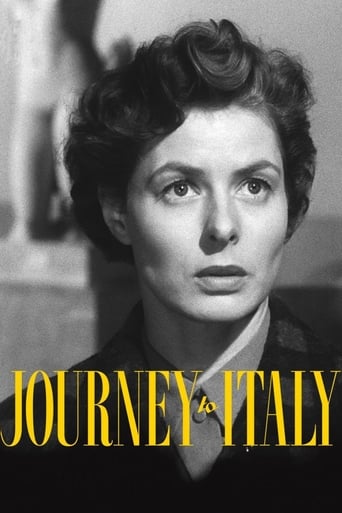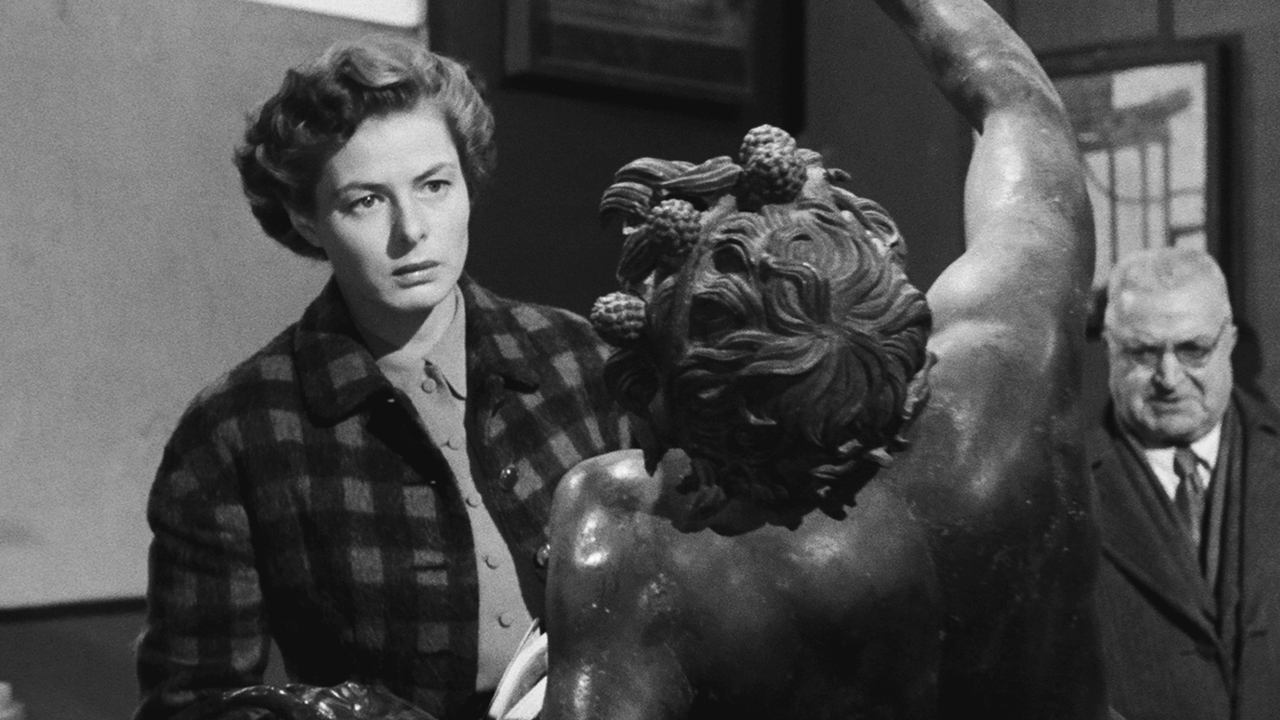antoniocasaca123
When I finished watching this movie, I remembered F.W. Murnau's "sunrise" and also Michelangelo Antonioni's (later) films. Also in this "viaggio in italia" there is not much that happens, however everything "little" that happens in the movie holds us attention, hypnotizes us and "glue" to the screen. This is just the third film I have seen of Roberto Rossellini, after "rome citta aperta" and "stromboli" (the latter also with Ingrid Bergman), films that I also liked a lot. Lately I have seen a lot of European cinema, mainly French and Italian, essentially from the 50s, 60s and 70s. European cinema is different, especially for those who are used to American cinema only. What happens is that when we first see Antonioni, Godard, Malle, Truffaut, Rosselini, Chabrol, etc., the first sensation we have is strange, but if we insist on continuing to watch films of these fantastic filmmakers we soon begin to discover a new cinema, which we learn to see with immense pleasure, that stimulates us, that opens us perspectives, that makes us think and that gives us immense joy to see. As with this beautiful Rossellini film.
Jackson Booth-Millard
This film is one I found listed in the pages of the book 1001 Movies You Must See Before You Die, I would probably never have been attracted to this film if it weren't for this recommendation, I hoped it would be deserved of it. Basically husband and wife Alexander 'Alex' (George Sanders) and Katherine Joyce (Ingrid Bergman) are a wealthy and sophisticated English couple who have travelled to Italy to to sell a large property they have recently inherited from a deceased uncle near Naples. Alex is a workaholic businessman, while Katherine is more sensitive, their relationship is cooled and strained by the journey to Italy, as well as Katherine remembering poignant memories of now deceased poet friend Charles Lewington, he died in the war. Katherine tours museums of Naples and Pompeii, Alex flirts with women on Capri, his sarcasm and bluntness and her critical nature cause their marriage to disintegrate within days of arrival, they agree at one point to consider divorce, but it is a religious procession in Pompeii that they are caught up and their love for each other is rekindled. Also starring Maria Mauban as Marie, Paul Muller as Paul Dupont, Anthony La Penna (Leslie Daniels) as Tony Burton and Anna Proclemer as Prostitute. To be honest, I could not concentrate fully on everything going on, because it was so chatty, only my interest in Bergman and the sights of Italy kept me engaged a little, it is perhaps to simple in narrative and plot, but if you see the journey of the title being both physical and spiritual I suppose you can get a little something out of watching this romantic drama. Worth watching, at least once, in my opinion!
MisterWhiplash
Roberto Rossellini wasn't about to rest too much on his laurels - or let a little thing like a controversy slow him down (an affair with Ingrid Bergman that wrecked marriages, albeit produced daughter Isabella which is nothing short of miraculous) - so a film like Journey to Italy seemed like just the thing to get him motivated and challenged. It's a challenging picture. There's not the same sort of melodramatic drive through a lot of it that you see in Rome Open City or even Stromboli - at least until perhaps the last third. I remember seeing the clips in Scorsese's Italian movies documentary, though it was hard to come by except on over-priced VHS online, until the Criterion collection put out a Rossellini/Bergman box-set, which gave me my chance last year.I have to wonder if Kubrick might've watched this film before making Eyes Wide Shut, if only for the early scenes. But there's little chance for real romance here; Bergman and George Sanders are the married couple, on holiday in Rome. Well, partly holiday anyway, more like an estate deal that's being closed on (an inhereted villa in Naples actually), and she's bored out of her mind... at first. Very slowly as she goes on trips to museums, encouraged by an acquaintance, there is a certain mood about Rome, a history, the objects which loom over her and speak to something MORE than what she is experiencing in her life and marriage, that do something to her.Of course, stuffy George Sanders can't see that - nor that their marriage isn't very happy at the moment, or about there being a lost lover in the equation as well (flirting for Sanders, too). And there may be more trouble on the horizon as well, but what's so fascinating is that Rossellini keeps a lot of things under the surface, the unspoken between the two, the tension, is what has to be put forward. For drama, this can be tricky, and Rossellini with his documentary background is able to get his actors to such a place as to be totally comfortable in their characters - people who are paradoxically uncomfortable with where they're at, romantically, spiritually (spirit's a big one), and geographically. And in a sense the ultimate message here reminds me of the line from Night of the Living Dead, where an unhappy married woman says to her husband: "We might not like living together... but dying together won't solve anything." Is this couple sort of, you know, trapped? Most likely, and the zombies are actual conflicts they're avoiding in life. A lot of what they end up seeing together is death. This comes by the way right when they tentatively agree after a really bad argument (there's a lot of arguing here by the way, but all believable because it's these two stars who are tremendous talents. They're taken along on an archaeological expedition, and they're privy to the remains of people from long ago. It's a startling, breathtaking sight for them, maybe more for Sanders in a way because he hasn't already been exposed to these bewildering, eye-opening sights like Bergman has. And this realization of one's mortality dawns ever closer.Journey to Italy was a prized darling among the French New Wave, and perhaps it's because of the questions it raises about life and death, love and loss, and having any sort of REASON for anything, that gives it an existential edge. Have things been too petty for them? Can they reconcile? The ending is where Rossellini finally lets things boil over dramatically speaking: in a way this is a more sophisticated film, if a little harder to exactly "enjoy" outside of a sort of intellectual level (unlike, say, Open City), but when Bergman and Sanders are torn apart, if only briefly, by a parade, it becomes a BIG struggle, and that's what counts. What will you do with the time you have here? Love, squabble, fight, bicker, take things in and experience things? Maybe all of those.I'm glad the movie was re-discovered and championed by those crazy bunch of Cashier du Cinema folks; the movie works its way ever so slowly on you, and has the layers of great art revealing itself. Did I mention how good these two actors are, especially Bergman again with her husband/musee? Good, it's worth repeating.
karendietz29
This is a film about relationships that is bereft of emotion. Bergman's character is self-centered, self-pitying,juvenile (while always physically luminescent); Saunders' is shallow, self-centered, aloof. There is not an iota of chemistry between the two; no believable relationship is portrayed, so their emotional estrangement rings hollow. The contrast between these annoying, entitled protagonists and an Italy ravaged by war, and it's impoverished people, is stark. After an entire film of emotional discordance, Bergman and Saunders are implausibly reunited at the last second. The only interesting element is the vivid scenes of Italy itself, and its ebullient, stalwart citizens.


 AD
AD

